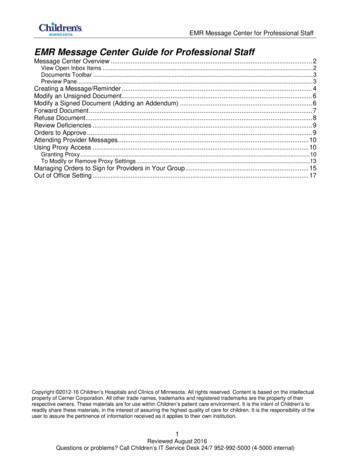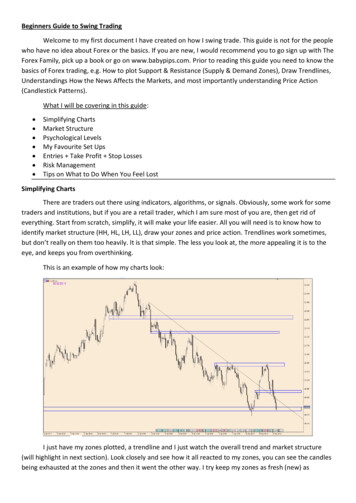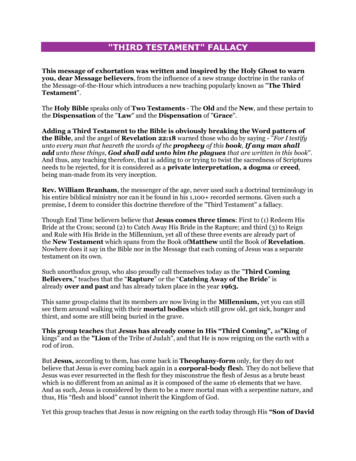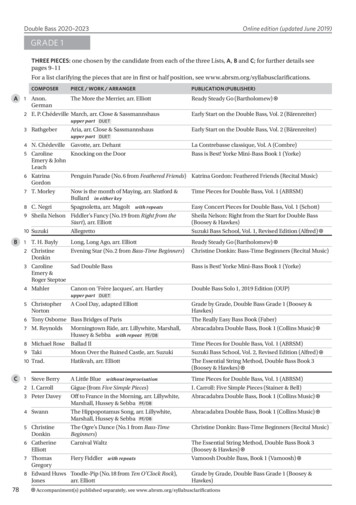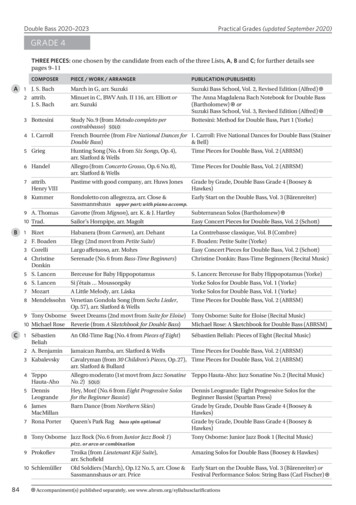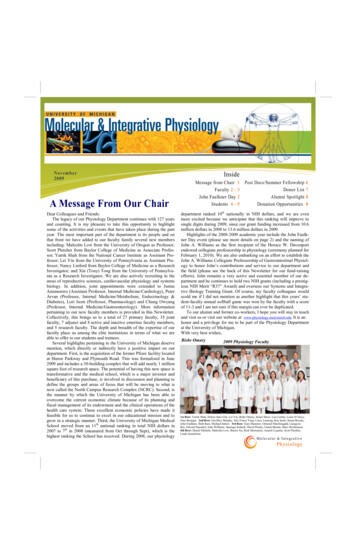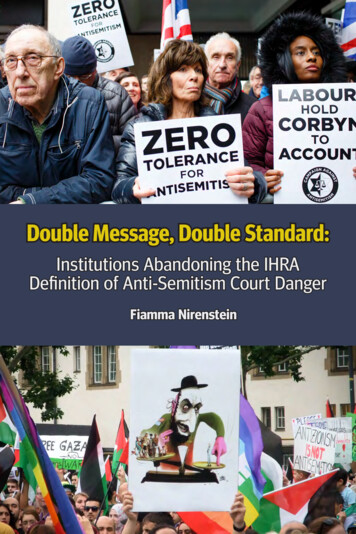
Transcription
Double Message, Double Standard:Institutions Abandoning the IHRADefinition of Anti‑Semitism Court DangerFiamma Nirenstein
Double Message,Double Standard:Institutions Abandoningthe IHRA Definition of Anti-SemitismCourt DangerFiamma NirensteinJerusalem Center for Public Affairs
Cover photos:Top:Demonstration against anti-Semitism in Britain’s LabourParty in London, April 8, 2018.(David Cliff/SOPA Images/LightRocket via Getty Images)Bottom: Radical leftists and Islamists hold anti-Israel protest featuringanti-Semitic imagery in Stuttgart, July 25, 2014.(@Emanzipation.und.Frieden/Facebook) 2021 Jerusalem Center for Public Affairs13 Tel Hai St., Jerusalem, 9210717 IsraelEmail: jcpa@jcpa.orgTel: 972-2-561-9281 Fax: 972-2-561-9112Jerusalem Center Websites:www.jcpa.org (English) www.jcpa.org.il (Hebrew)www.jcpa-lecape.org (French) www.dailyalert.orgThe Jerusalem Center for Public Affairs is a non-partisan, not-for-profitorganization.ISBN: 978-965-218-157-2
ContentsPreface: Standing Up to Modern Anti-SemitismAmbassador Dore Gold Introduction Webinar Speakers Adopting the IHRA “Working Definition” Does Not AbsolveInstitutional Anti-Semitism IHRA Definition of Anti-Semitism: Formal “Adoption” or Real Implementation? Institutional Anti-Semitism The Three Pillars of Institutional Anti-Semitism Nazification Denial of Sovereignty Iran Appendix Timeline of Events Presentation Notes 578912141718212729294045
Preface:Standing Up to Modern Anti-SemitismAmbassador Dore GoldToday’s anti-Semitism exhibits phenomena which attempt todelegitimize and criminalize the State of Israel. Former Israeliofficers have been threatened with arrest for alleged war crimes ifthey visit certain European countries. From Norway to the UK, onehears of boycotts against Israeli universities, products as well as tradesanctions. European media outlets from France-2 to the BBC spreadutter fabrications about Israeli behavior from politicized reporters andby agenda-driven non-governmental organizations. Israeli diplomatsfind themselves accosted in European universities and even attackedby mobs. It is rare to find a university debate over the legitimacy ofFrance or Italy, yet such debates over Israel have been held at Britishuniversities.Delegitimization of Israel also emanates from a revival of classicalWestern anti-Semitism, which has become more permissible the moretime passes since the Holocaust. For this reason, delegitimizers alsoengage in Holocaust-denial, or “Holocaust inversion,” attributingto Israel the crimes committed against the Jewish people during theSecond World War.Jerusalem Center Fellow Fiamma Nirenstein has been fightingcourageously and tirelessly against the renewed manifestations ofanti-Semitism in Europe. To oppose this modern-day scourge, shehas used her platforms as a journalist, as former Vice President of theCommittee on Foreign Affairs in the Italian Chamber of Deputies, andas chair of the Committee for the Inquiry into Anti-Semitism, and atthe Council of Europe in Strasbourg. The Jerusalem Center is proudto publish her most recent initiative, in which Nirenstein observes thedisturbing discrepancy within institutions which have adopted theIHRA definition, ostensibly in a commitment to fight anti-Semitism,5
Double Message, Double Standardwhile nevertheless simultaneously issuing statements or taking actionswhich violate the definition’s very standards.The International Holocaust Remembrance Alliance (IHRA) wascreated in order to avoid the blurring of this line. Yet countries andinstitutions that claim to be combating anti-Semitism often fail torecognize that anti-Zionism is just another form of anti-Semitism. AsNirenstein notes in this monograph, although a very large numberof countries and institutions have adopted the IHRA definition, thepolitical stereotypes that generate anti-Semitism still can be detectedin innumerable official speeches, political resolutions, donations, andpromotions of organizations devoted to the delegitimization andboycotting of Israel.Together with Fiamma Nirenstein, the Jerusalem Center for PublicAffairs will continue to call out institutional anti-Semitic behaviorin Europe and shine the light of truth on actions by countries andinstitutions that persist in crossing the line in their manifestation ofcontemporary anti-Semitism.6
IntroductionThis publication follows a webinar which took place on September15, 2020 on the topic: “Assessing the Role of Institutions in the Fightagainst Anti-Semitism.”The discussion featured prominent speakers and drew hundreds ofviewers. Deliberations focused on institutions – local, national, andinternational – and their role in fighting (or perpetuating) modernanti-Semitism and anti-Zionism. Frequently masked as politicalcriticism of Israel, this conflation often legitimizes anti-Semitic andanti-Zionist rhetoric and activity. It also often implicitly endorses alethal environment espousing hatred of Jews and the Jewish state.Ironically, and as a matter of deepening concern, this phenomenonhas continued despite the fact that European nations have adoptedthe International Holocaust Remembrance Alliance (IHRA) definitionof anti-Semitism. We are profoundly convinced of this definition’shistorical importance and international value. It casts a light on thebasic manifestations of contemporary anti-Semitism; a transitionfrom the use of classical anti-Semitic stereotypes to the new antiIsraeli images which do not constitute legitimate criticisms of theJewish State. This publication focuses on one point – the discrepancybetween the formal adoption of the IHRA and its actual applicationby the many countries and institutions that have approved it. Toooften, their fight against anti-Semitism is weakened by the inability torefrain from stereotypes. This results in anti-Semitism reinforced bythe very institutions which adopted IHRA in the first place.Clearly we are strongly in favor of IHRA and of the institutions thatadopted it. Nevertheless, institutions must practice what they preachand work to fight anti-Semitism consistently, on all fronts, and underall circumstances.Finally, I wish to thank Ruthie Blum and Dr. Tommaso Virgili for theirgracious and helpful editing.7
Double Message, Double StandardWebinar SpeakersAmb. Dore Gold, President, Jerusalem Center for Public AffairsDr. Fiamma Nirenstein, Jerusalem Center for Public AffairsAmb. Elan S. Carr, U.S. Special Envoy for Monitoring and CombatingAnti-SemitismAmb. Emanuele Giaufret, Head of the Delegation of the EuropeanUnion to the State of IsraelLord John Mann, Adviser to the British Parliament on Anti-SemitismProf. Milena Santerini, Italian National Coordinator on CombatingAnti-SemitismSzabolcs Takacs, Head of the Hungarian IHRA DelegationDan Diker, Director of the Political Warfare Project at the JerusalemCenter for Public AffairsDaniel Schwammenthal, Director of the AJC Transatlantic Institutein BrusselsDr. Charles A. Small, Founder and Director of the Institute for theStudy of Global Antisemitism and Policy; Research Scholar at St.Antony's College, Oxford UniversityProf. Gunther Jikeli, Professor in Jewish Studies at Indiana University,BloomingtonRebecca Mieli and Ben Hayton, Jerusalem Center interns8
Adopting the IHRA “Working Definition” Does NotAbsolve Institutional Anti-SemitismFiamma NirensteinOn November 4, 2020, 142 nations approved a UN General Assembly(UNGA) resolution that “reaffirms that the Israeli settlements inthe Occupied Palestinian Territory, including East Jerusalem, andthe occupied Syrian Golan are illegal and an obstacle to peace andeconomic and social development ”1That is a large number of countries, especially considering thecontroversial nature of the resolution and the fact that some eminentscholars and politicians do not support the claim that Israeli-controlledJudea and Samaria are “illegally occupied Palestinian territory.”In the course of 2020, the UNGA condemned Israel in 17 resolutions—almost three times more resolutions against the rest of the world (atotal of 6 resolutions)2—all of which passed by an overwhelmingmajority.The UNGA votes are part of a series of measures aimed atdelegitimizing the Jewish State disproportionately compared to anyother UN member state. This double standard opposes the manydeclarations and official positions adopted by UN members honoringthe morality of fighting anti-Semitism.But the link between anti-Semitism and the systematic condemnationand institutional persecution of Israel has often been denied. Unlikethe former, the latter is categorized as a legitimate form of politicaldiscourse—an example of free speech.Indeed, many, if not most, local, national, and international institutionsare unable to distinguish between freedom of speech and antiSemitism. There is little doubt that the anti-Semitic phenomena9
Double Message, Double Standardexhibited today are attempts to delegitimize and criminalize the Stateof Israel. The International Holocaust Remembrance Alliance (IHRA)was created in order to avoid the blurring of this line.More than 30 western countries are part of the IHRA,3 and though its“working definition” of anti-Semitism—which more than 25 countrieshave adopted for internal use—is not a legal document, the Alliancehas fashioned a frequently used framework for identifying anti-Semiticbehavior.4Individual states in the United States, as well as other governmentsand organizations, have employed the IHRA working definition toforge laws and policies against the Boycott, Divestment, and Sanctions(BDS) movement. A key victory on this score was the defeat of theanti-Semitic leadership of Britain’s Labour Party and the expulsion ofits former leader, Jeremy Corbyn, from the political scene.Nevertheless, the political fight is still being waged due to growingglobal anti-Semitism. The conclusion is evident: even after the IHRAwas adopted, results are not forthcoming. On the contrary, countriesand institutions that claim to be combating anti-Semitism—andappoint special “rapporteurs” and “representatives” for this purpose—are either conscious or unwitting spreaders of this historical disease.In response to the post-WWII resurgence and shocking expansion ofanti-Semitism, a group of us—including myself, British Lord JohnMann, and former Canadian Justice Minister Irwin Cotler, amongothers—founded the Inter-Parliamentary Coalition for CombatingAnti-Semitism (ICCA). We first met in London in 2009 and Ottawa in2010, where we worked hard to join the definitions of anti-Zionismand anti-Semitism as accepted by our many members. Our effortsbore fruit.At the time, the delegitimization of Israel as a weapon of anti-Semitismwas relatively new; it took a while before it became a mainstream“war.” As members of different parliaments, we needed to develop astrategy of engagement with institutions.10
Fiamma NirensteinOur governing bodies were born out of the victory against Nazifascism following World War II. They, therefore, embraced the taskof defeating the disease that had brought on the planned destructionof the Jewish people in the past, yet had now begun to infect peoplewith a very clouded vision of the nature of Israel as a state.The Cold War presented a biased vision of Israel’s history, brought onby the country’s geographical position in the middle of the Arab worldand the necessity to defend itself militarily. Defending itself politicallyand ideologically became even more difficult for Israel following itsvictory in the 1967 Six-Day War.The late historian Prof. Robert Wistrich, the late Dr. ManfredGerstenfeld, and several of their colleagues, including myself, sowedthe seeds for the IHRA definition of contemporary anti-Semitism inlectures, articles, and books. We demonstrated how anti-Semitism wasnot relegated only to old stereotypes and ideologies but to the hateagainst the state of the Jews as a collective, as well. To distinguish itfrom the old anti-Semitism and underline its irrationality, I called thisnew version “Israelophobia.”Presentations at the 2004 conference on anti-Semitism in Berlin, hostedby the Organization for Security and Co-operation in Europe (OSCE)and including testimonies by Cotler and Italian politician MargheritaBoniver were instrumental in understanding current trends. This eventtook place three years after the original embodiment of anti-Israeli/anti-Semitism: the UN’s World Conference against Racism in Durban,South Africa.The OSCE conference was just an initial step, as its concludingdocument merely “declares unambiguously that internationaldevelopments or political issues, included those in Israel and theMiddle East, never justify anti-Semitism.”5It would take more than a decade after that for anti-Zionism to berecognized as another form of anti-Semitism.11
Double Message, Double StandardIHRA Definition of Anti-Semitism: Formal “Adoption” orReal Implementation?Even after anti-Semitism was identified as overwhelmingly anti-Israel,a new challenge emerged—one from both the left and the right.Although a very large number of countries and institutions haveadopted the IHRA definition, the political stereotypes that generateanti-Semitism can still be detected in innumerable official speeches,political resolutions, affiliations (such as Corbyn’s 2019 attendanceat a Hamas-linked conference in Geneva to campaign for the releaseof convicted Palestinian terrorists), donations, and promotions oforganizations devoted to the delegitimization and boycotting of Israel.Many institutions do not wish or are unable to consider how thisongoing behavior generates anti-Semitism. Even institutions that haveadopted the IHRA definition and proclaim their faithfulness to thememory of the Holocaust, can, and do create anti-Semitic sentiment.When they repeat statements claiming that Israel is “an illegaloccupying power of Palestinian territories,” for example, they areequating it to a colonialist, racist entity. The same goes for UNESCOand similar organizations when they declare that the Temple Mountand all of Jerusalem are “historic Islamic sites” —despite being partand parcel of the Jewish people’s historic homeland.This attitude, along with many other methods of delegitimizing theState of Israel, is reiterated by institutions that have adopted both theIHRA definition of anti-Semitism and what Natan Sharansky calls the“three Ds”: Demonization, Delegitimization and Double Standard.Not only is anti-Semitism not rejected in the contemporary world, itis not forbidden in the current political-institutional climate, either.From the statements of former Malaysian President Mahathir binMohammad—who called Jews “hook-nosed” and said that all theproblems in the Middle East began with Israel’s creation—to formerU.S. President Barack Obama and his European counterparts, who12
Fiamma Nirensteinpursued reconciliation with the Iranian regime, despite its declarationsof intent to wipe the Jewish state off the face of the earth.Obama’s last act in the UN Security Council was neglecting to vetoan anti-Israel resolution devoted to Israel’s delegitimization whichsupported the concept of Israel's illegitimate occupation of Jerusalem,consolidating the concept of the illegitimate occupier of Jerusalem orthe Middle East. This is one of the best illustrations of contemporaryinstitutionalized anti-Semitism.But such open expressions of anti-Semitism are not the only problem.Silence is just as ominous, as it invites, even unintentionally, hatredof the Jews and their state. Recall that both President Barack Obamaand former European Union High Representative for Foreign Affairsand Security Policy Federica Mogherini ignored Tehran’s genocidalattitude toward Israel and instead gave Iranian Foreign MinisterMohammad Javid Zarif every benefit of the doubt during the 2015JCPOA negotiations. The same thing is happening now in the renewednegotiations between Iran and the P5 1.Another is the meeting between French President Emmanuel Macronand Palestinian Authority leader Mahmoud Abbas during theconference against anti-Semitism in 2020. Macron neglected to ask“Abu Mazen” why he said that Jews desecrate the site of the Al-AqsaMosque “with their filthy feet.”6Nor did anyone call to task the member of the European Parliamentwho applauded Abbas for affirming, in an official speech, that Israelirabbis urged that the water be poisoned to kill Palestinians.7The same silence is glaring at universities, where nobody questions“Israeli Apartheid Week” on campus.It is worse than useless, then, for countries, local governments, oracademic institutions to endorse IHRA. In fact, it defeats the IHRA’svery purpose, since there is no meaning to or consequence for itsviolation.13
Double Message, Double StandardIndeed, it is not enough for IHRA to be adopted; it must beimplemented. Yet, most of the bodies that have adopted it and evennominated someone to implement it, have not dared to make use of itas a weapon in the political battle against anti-Semitism. This is evidentin the spread of anti-Semitism by and within institutions. Ironically,it is even more exaggerated in those institutions that have adoptedthe IHRA.It is clear that the European Union, for instance, is at least partlyresponsible for the growth of anti-Semitism among Europeans. Whetherexpressed by Christians or Muslims, an attitude of delegitimizationtoward Israel appears in speeches and resolutions. The public receivesfrom this, an alibi for its chronic right-wing or left-wing anti-Semiticpopulism.What, then, constitutes the correct implementation of the IHRAdefinition?The definition of contemporary anti-Semitism relates to what Dr.Martin Luther King Jr. identified as modern anti-Semitism: hatred ofIsrael. Of course, this must be distinguished from legitimate criticismof Israeli government policies. If this definition and distinction weretruly followed, the task of political institutions’ fight against antiSemitism would be more credible.During Israel’s clash with Hamas in May 2021, the terroristorganization launched over 4,000 rockets to Israeli cities and towns,which in turn brought rigorous Israeli retaliation to Hamas targets inGaza. The confrontation prompted a surge of violent demonstrationsin which protesters’ demands indiscriminately linked anti-Zionismand naked Jew hatred. True, specific European governments issuedstatements in support of Israel’s right to defend its citizens from rocketfire. Yet notwithstanding institutions’ adoption of the IHRA definitionof anti-Semitism, statements from numerous institutions, universitiesand on the street degenerated into large scale attacks on Jews thatmade front page news worldwide. Institutions must do a better job14
Fiamma Nirensteinof implementing their commitment to the IHRA definition of antiSemitism.Institutional Anti-SemitismToday, it appears that some institutions are quite organized andadvanced in their fight against modern anti-Semitism. We can seeinstitutional action that combats Holocaust denial, for instance, whichthey condemn and even fight through educational or legal measures.This is particularly noticeable when institutions observe Jewishmemorial days or promote the study of the cultural and religioushistory of the Jewish people. Of course, blatant anti-Semitic physicalattacks—such as the murder of Jews or destruction of Jewish property,monuments, or symbols—are often met with an appropriate responseby the security apparatuses of each country.Post-modern societies, based on civil rights, normally include thevalue of religious freedom, but this is quickly disregarded when itcomes to Jewish tradition. Belgian law banning ritual slaughter, forinstance—although well-intentioned towards animals—creates anobjective problem for the Jewish community, making life in Belgiumnearly impossible for observant Jews.The Sabbath, Jewish holidays, dress codes, and symbols may beaccepted more than ever, both in the United States and Europe. Butincreasing ignorance, which is directly related to the decline in thestudy of history, is a threat. Indeed, knowledge would contribute toreciprocal religious respect and help fight anti-Semitism.In a broader sense, contemporary, post-modern values are oftenchallenged by the very existence and nature of the State of Israel.After WWII, the concepts of nationhood and war became enemies ofmodern Western thought, morality, and institutions. As a result, muchof the West waves an imaginary international flag and views Jewishstatehood as part of colonialist history, inherently an enemy of peace,15
Double Message, Double Standardand an example of old-style nationalism whose imperialist dream hasbrought war and racism.This was the Soviet version of events, which later became the socialdemocratic version, and still later, became the unofficial EU versionof the Israeli-Palestinian conflict. Examples of this ideological trendabound.Take the incident of Daniel Bernard, the French ambassador to theUnited Kingdom, who—at a dinner party in London at the home ofnewspaper magnate Conrad Black in 2001—said, “All the currenttroubles in the world are because of that shitty little country Israel.Why should the world be in danger of World War III because of thosepeople?”8In 2004, Greek composer Mikis Theodorakis called Jews “the root ofevil” and referred to then-Israeli Prime Minister Ariel Sharon’s policiestowards the Palestinians as “Nazi-like.”9Similar comments were uttered by German novelist and Nobel Prizewinner Günter Grass10 and Portuguese author and Nobel Prize laureateJosé Saramago.11When Western elites express such vitriol, it has an influence on thesurrounding society, which knows little or nothing about Israel.But, Israel is actually a country that strives for peace. It is ready andwilling to make concessions and uphold treaties, as is apparent in therecent signing of the Abraham Accords.Israel creates conditions under which peace can develop, throughits pursuit of knowledge and technology. Israel’s approach to theCOVID-19 pandemic is illustrative in this regard, placing the wellbeingof Israel’s citizens and a thriving society at uppermost priority.The EU, however, has been strongly influenced by Europe’s left-wingideological origins. The new guard of social-democratic European16
Fiamma Nirensteinleaders of the 1960’s—Sweden’s Olof Palme, Germany’s Willy Brandt,and Austria’s Bruno Kreisky—had a tremendous impact.The emotional and diplomatic blackmail imposed by Palestinianterrorist organizations, along with Soviet influence and oil embargos,created an ideological rejection of Israel, which became even morepronounced after its Six-Day War victory. When Arab interests weredisrupted in 1967, the problem of “occupation” and “borders” playedon European guilt, connected historically to the 1916 European SykesPicot Agreement that divided up the Middle East.The outcome of the war was promptly incorporated into thepropaganda of the Arab world and portrayed as the theft of territoryfrom its original owner. This provided a basis on which to strengthenthe idea that Israel was born in sin and developed through a series ofillegitimate acts of aggression and illegal appropriation. According tothis “third-world” notion, Palestinians were the rightful inhabitantsof the land that Israel stole from them.Taking advantage of the cultural and political climate of a stunningIsraeli victory, spreaders of the Palestinian narrative provided acomfortable way for apologists to forget how perniciously antiSemitism infected European political discourse for the 2,000 yearsleading up to the Holocaust.The Three Pillars of Institutional Anti-SemitismOur interns, Rebecca Miele and Ben Hayton, identified the followingthree pillars in statements issued by institutional actors, as noted intheir research:1. Nazification: The idea that “the Jews do to the Palestinians what theNazis did to them,” and therefore are cruel, murderous warriors,ready to commit the worst criminal acts in order to conquer theland, and are devoted to the physical elimination of the Palestinianpeople.17
Double Message, Double Standard2. Denial of sovereignty: The expression “illegally occupied territories,”is devoid of any historical and legal context, and suggests thecriminality of its perpetrator, Israel.3. Negation of the Iranian threat: The Iranian regime vows to destroythe State of Israel and, surprisingly, western institutions refuseto confront it. This suggests that in international discourse, it ispermissible to express a genocidal intention towards the Jews.Incredibly, when the High Representative of the EU for ForeignAffairs and Security Policy Josep Borrell served as EU minister offoreign affairs, he went as far as to acknowledge this by saying,“Iran wants to wipe out Israel; nothing new about that. You haveto live with it.”12NazificationThe latest example of Nazification is the International CriminalCourt’s decision to investigate Israel for “war crimes” that it ostensiblycommitted during an operation of self-defense against terrorists inGaza.The institutional outrage against Israel can be traced to the passagein 1975 of UNGA Resolution 3379, known as the “Zionism Is Racism”resolution.The language of the resolution could have been taken from a pageof Soviet propaganda. As Lenin explained in 1907, “The wording iscalculated to provoke in the reader, hatred, disgust, contempt. Thephrasing must be calculated not to convince but to destroy, not tocorrect the adversary’s mistake, but to annihilate his organization andwipe it off the face of the earth.”The passage of the resolution was a historic turn toward thedelegitimization of Israel. It is what Wistrich called “Holocaustinversion,” which the Soviet Union owned and bequeathed to thePalestinians and their “internationalist” movement.18
Fiamma NirensteinIt is thus that the Soviet Union’s Permanent Delegate to the UN, N.T.Fedorenko, was able—a mere 30 years after the defeat of Nazism—tostate with impunity: “The overweening aggressors have taken overthe notorious theories of geopolitics, of Lebensraum, of establishinga ‘new order’ and ‘vital frontiers’ in the Middle East. The people arefamiliar with these ultimatums. It was the Nazi conquistadors thatset out to reshape the map of Europe and the world and attemptedby armed forces to impose what they called a ‘new order.’ Howmonstrous that these devices of the Nazi brigands, condemned bythe International Military Tribunal in 1946, have been revived by agovernment claiming to represent the people who suffered so bitterlyat the Nazi butchers’ hands!”13Though the resolution was repealed in 1991, it has served as a longstanding foundation for the labeling of Israel, as evil. The Jewish stateis either accused of using “excessive force” against terrorists or isdefined, with no factual basis, as an apartheid state.Echoes of such Nazification can still be detected in the officialinternational arena. The very establishment of the UN Relief andWorks Agency for Palestine Refugees in the Near East (UNRWA), forexample, provided a carte blanche for Israel-haters to demonize theJewish state. After all, UNRWA is unique in its granting of the right ofthese “refugees” to a homeland void of the “colonialist force,” Israel,it encourages the expectation of the expulsion of the land’s temporaryoccupants, the Jews.Four years into the Second Intifada (2000-2005), when Israeli civilianswere subjected to daily suicide bombings and other Palestinian attacks,then-EU Foreign-policy chief Javier Solana, along with other Europeanforeign ministers, condemned Israel’s assassination of Hamas terroristleader Sheikh Ahmed Yassin.Three years earlier, in 2001, then-Finnish Foreign Minister ErkkiTuomioja, who later became a spokesperson for EU foreign policy,compared Israeli measures to Nazi measures.1419
Double Message, Double StandardIn 2002, the Hellenic Parliament Speaker Apostolos Kaklamanis saidthat “the entire Greek people, parliament, government, and politicalparties condemn the genocide that is being carried out today inPalestine.”15Around the same time, both Greek and Swedish media outlets accusedthe IDF soldiers in the field of killing Palestinians to harvest andtraffic their organs, and Swedish and British officials accused Israel ofemploying Nazi methods against the Palestinians. (Years later, in 2016,then-Swedish Foreign Minister Margo Wallström would call Israel’santi-terrorist operations “extrajudicial executions.”)16In 2004, a study by the University of Bielefeld surveyed Germanadults on whether they agreed with the statement: “What the stateof Israel does today to the Palestinians is in principle not differentfrom what the Nazis did to the Jews in the Third Reich.” Fifty-onepercent answered in the affirmative. Sixty-eight percent agreed withthe statement that “Israel undertakes a war of destruction against thePalestinians.”But the worst anti-Semitism in the EU was expressed in 2009-2010,following Israel’s Operation Cast Lead, and again in 2014-2015, afterOperation Protective Edge. During those periods, Europeans stagedmany demonstrations supporting Gaza while ignoring the Palestinianterrorist attacks on Israelis.In the wake of the former, the now-infamous Goldstone Report’s“Commission of Inquiry” was launched in January 2009 under the UNHuman Rights Council’s auspices. It was so clearly established with aforegone conclusion—that the IDF intentionally targeted Palestiniancivilians in Gaza—that even then-UN High Commissioner for HumanRights, Mary Robinson, turned down the role of leading the mission,as she considered it “guided not by human rights but by politics.”17During the period leading up to Europe’s endorsement of the report(which Goldstone later retracted), anti-Semitic incidents in Europemore than doubled from the previous year.20
Fiamma NirensteinIn Norway, the book Eyes on Gaza made similar claims as Goldstone,stating that Israeli troops entered Gaza with the plan to attack wome
Double Message, Double Standard. while nevertheless simultaneously issuing statements or taking actions . which violate the definition’s very standards. The International Holocaust Remembrance Alliance (IHRA) was . created in order to avoid the blurring of this line. Yet countries and .

